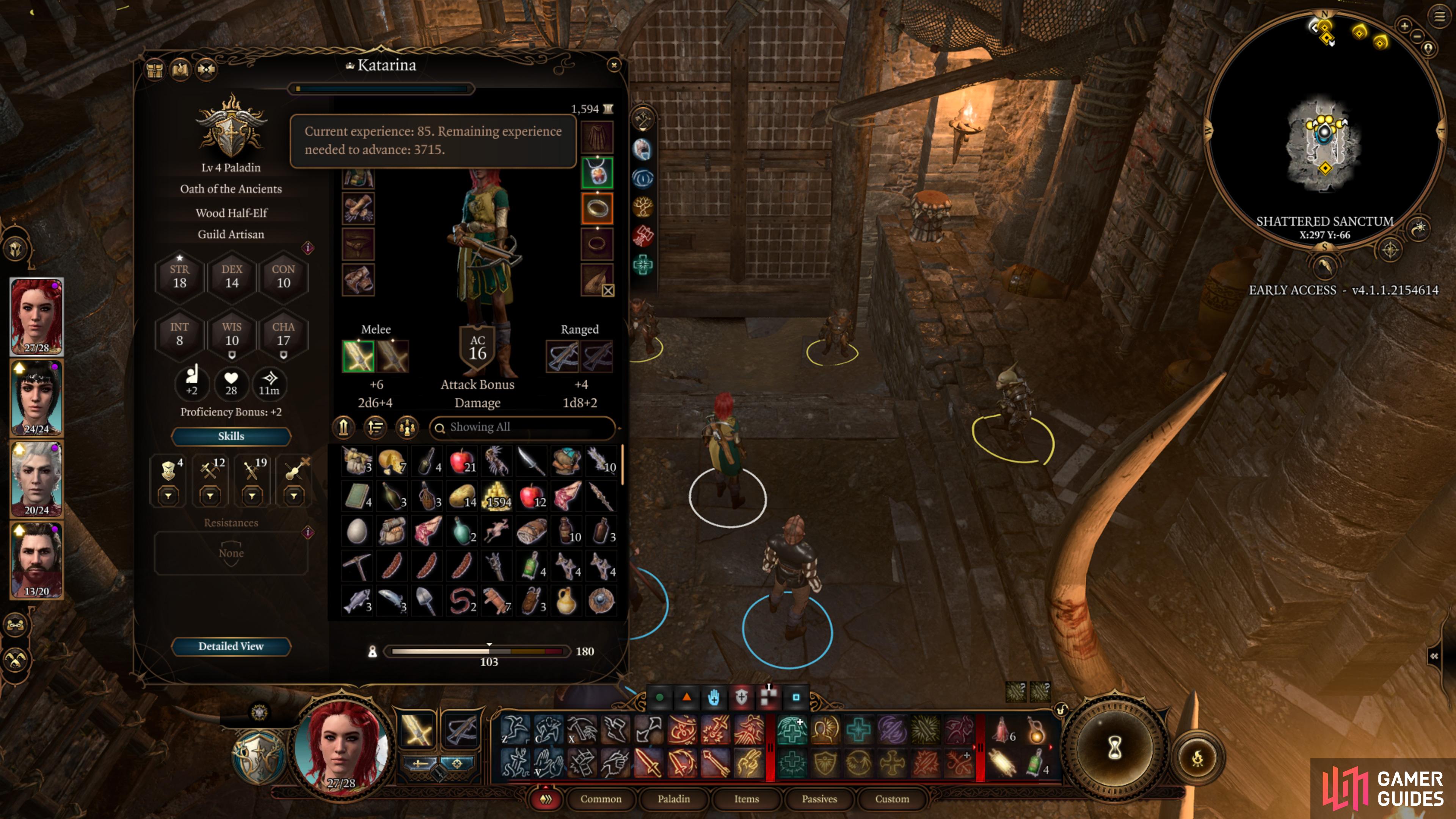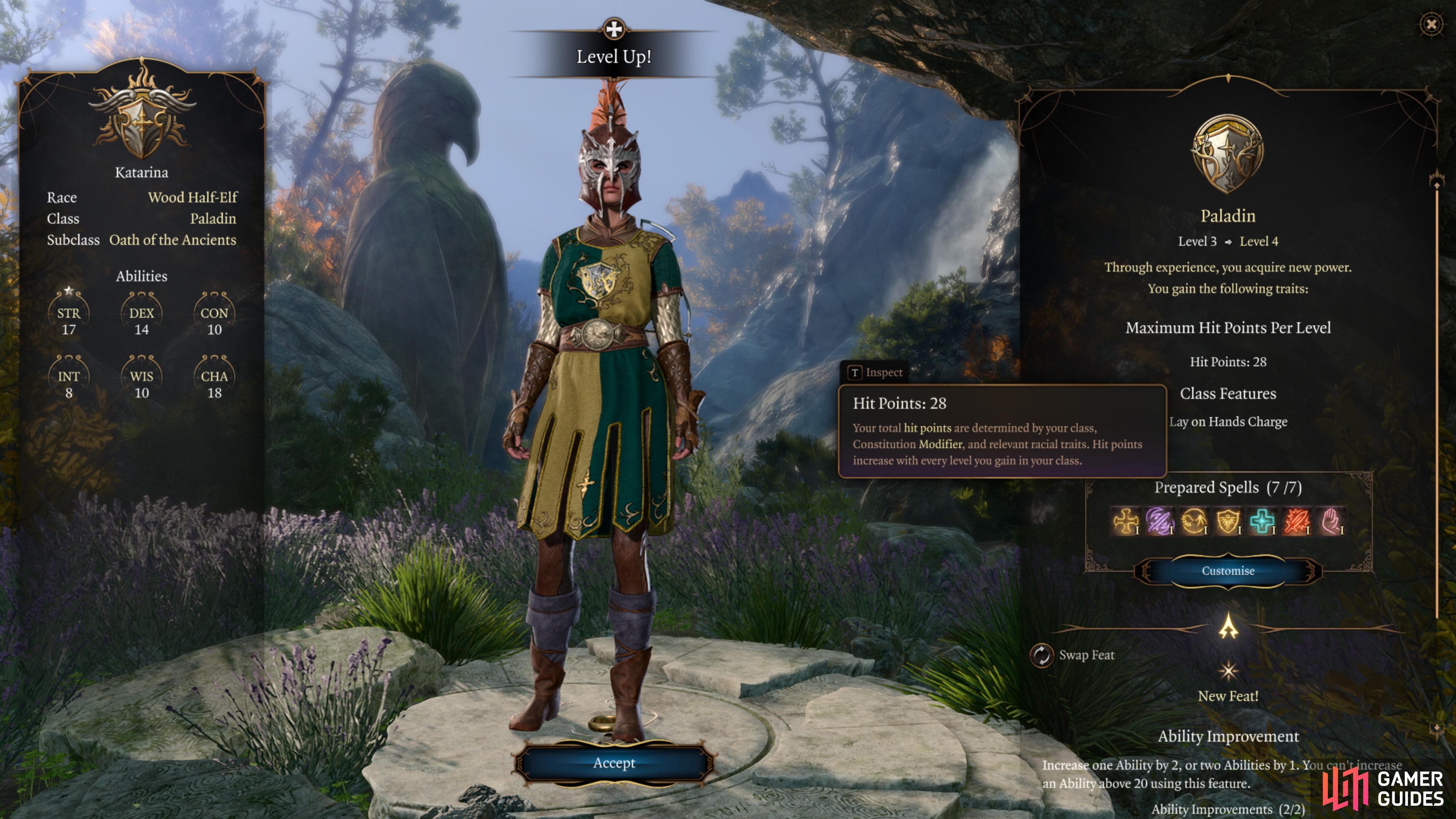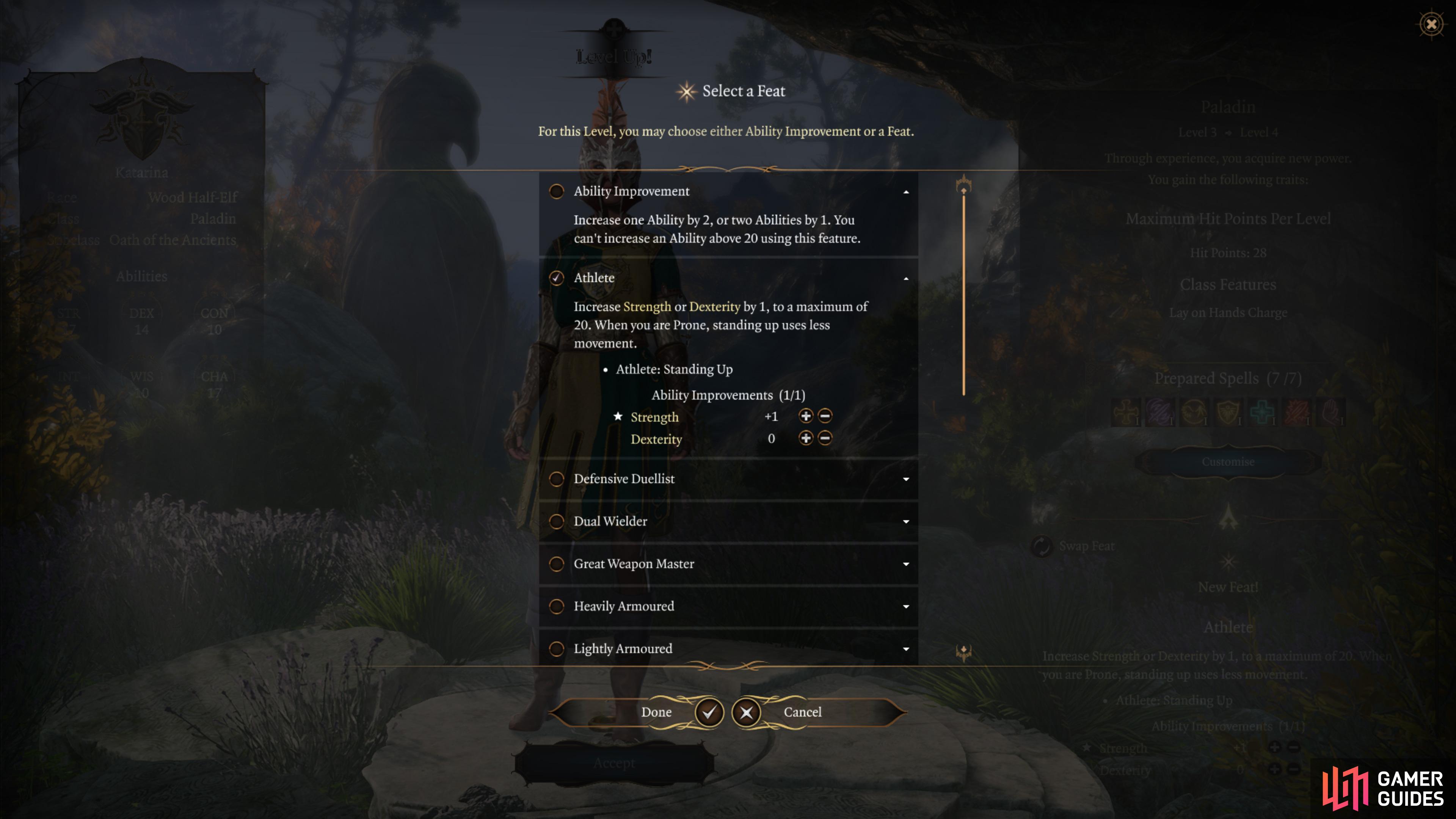As you perform deeds of daring-do - defeating enemies, solving puzzles, succeeding at certain Ability Checks and generally progressing through and completing quests - you’ll earn experience points. Gain enough experience and your level will increase, which generally increases a character’s durability and competence. In this page we’ll qualify and quantify the gains characters make when they level up in Baldur’s Gate 3.
As you adventure, you’ll gain experience. Earn enough experience and your level will increase.
Baldur’s Gate 3 Leveling Guide - How Much Experience Does it Take to Level Up?¶
Below you’ll find a table listing the experience values you’ll need to accrue in order to level up. Hitting the max level of twelve in Baldur’s Gate 3 requires you to rack up a cool 100,000 experience points.
Experience Tables in Baldur’s Gate 3¶
| Level | Experience Required |
|---|---|
| 1 | 0 |
| 2 | 300 |
| 3 | 900 |
| 4 | 2,700 |
| 5 | 6,500 |
| 6 | 14,000 |
| 7 | 23,000 |
| 8 | 34,000 |
| 9 | 48,000 |
| 10 | 64,000 |
| 11 | 85,000 |
| 12 | 100,000 |
Baldur’s Gate 3 Leveling Guide - What Do Characters Gain When They Level Up?¶
As mentioned earlier, when hitting certain experience benchmarks, characters will level up, effectively allowing them to allocate one level into any class they choose. Often this is the same class the character started as, but they can choose to gain a level in another class, if they so desire. For example, a 1st-level Fighter gains 300 experience, which is enough for them to ascend to level 2. They can allocate that level into increasing their Fighter level (becoming a 2nd-level Fighter) or they can pick a different class, say Rogue. They’ll still be level 2, but they’ll be a 1st-level Fighter and a 1st-level Rogue.
For the sake of clarity, we’ll call a character’s overall level their “character level” and their individual class levels their, well, class levels. Generally, a character’s class level determines what class features they have access to while their character level determines how durable and generally competent they are with what they’re currently Proficient with. For example, a level 6 character who is a 3rd-level Fighter and a 3rd-level Wizard might have the Hit Dice and Proficiency Bonus due a 6th-level character, but they only have access to the class features of a 3rd-level Fighter and Wizard (i.e. no access to 3rd-level Wizard spells, no Extra Attack from Fighter, etc.)
General bonuses from increasing your character level can be found below:
(1 of 2) When a character levels up they’ll gain a number of Hit Points based on the Hit Dice appropriate for the class they’ve chosen.
When a character levels up they’ll gain a number of Hit Points based on the Hit Dice appropriate for the class they’ve chosen. (left), Depending on the class chosen, characters may also obtain various class features, including new spells and class abilities. (right)
Stat Gains by Character Level in Baldur’s Gate 3¶
| Level | Hit Dice | Proficiency Bonus | Ability Score Improvement |
|---|---|---|---|
| 1 | 1 | +2 | – |
| 2 | 2 | +2 | – |
| 3 | 3 | +2 | – |
| 4 | 4 | +2 | +1 |
| 5 | 5 | +3 | – |
| 6 | 6 | +3 | – |
| 7 | 7 | +3 | – |
| 8 | 8 | +3 | +1 |
| 9 | 9 | +4 | – |
| 10 | 10 | +4 | – |
| 11 | 11 | +4 | – |
| 12 | 12 | +4 | +1 |
Baldur’s Gate 3 Leveling Guide - Hit Dice and Hit Points Upon Level Up¶
Every time you level up, you’ll gain an extra Hit Dice, which will add a varying number of Hit Points to your total Hit Point pool depending on the chosen class. Warriors tend to get greater Hit Dice values than casters, and the general formula for determining Hit Point gain at each level is: Hit Dice average (rounded down) + Constitution Modifier. For more details, check out the Hit Points and Hit Dice in Baldur’s Gate 3 page.
| Class | Hit Die | HP/Level |
|---|---|---|
| Barbarian | d12 | 6 |
| Bard | d8 | 4 |
| Cleric | d8 | 4 |
| Druid | d8 | 4 |
| Fighter | d10 | 5 |
| Ranger | d10 | 5 |
| Rogue | d8 | 4 |
| Paladin | d10 | 5 |
| Sorcerer | d6 | 3 |
| Warlock | d8 | 4 |
| Wizard | d6 | 3 |
Baldur’s Gate 3 Leveling Guide - Proficiencies and Proficiency Bonus Upon Level Up¶
Proficiencies determine what your character is most competent at, and depending on your race and starting class you’ll have access to different proficiencies. In some cases (like with armor proficiencies), being proficient just allows you to use said armor without suffering penalties, but in most cases the difference between being proficient or not is being able to apply your Proficiency Bonus to checks. The Proficiency Bonus applies to the following:
- Attack rolls with spells and weapons you’re proficient with.
- Ability checks, if you’re proficient with a weapon, Saving Throw, Skill or tool.
- Saving Throws
- Saving Throw DCs for spells you cast
- Skill checks
Over the course of the entire game your Proficiency Bonus will range from a measly +2 at the start to a whopping +4 at the end. Doesn’t sound like much, and really, it’s not, but in a d20 system like Dungeons and Dragons, a check with a +4 bonus is much more likely to succeed than one with no bonus. Remember that your class levels determine what you’re proficient with, but it’s your overall character level that determines what your Proficiency Bonus actually is. Note that when multiclassing you do not gain all the proficiencies that the new class would have had if you started as said class. Instead, you gain the following new proficiencies when you multiclass in addition to whatever your starting class gave you (redundant proficiencies will be ignored):
Proficiencies Gained When Multiclassing¶
| Class | Multiclass Proficiencies |
|---|---|
| Barbarian | Shields, simple weapons, martial weapons |
| Bard | Light armor, one skill of your choice, one instrument |
| Cleric | Light armor, medium armor, shields |
| Druid | Light armor, medium armor, shields |
| Fighter | Light armor, medium armor, shields, simple weapons, martial weapons |
| Monk | Simple weapons, shortswords |
| Paladin | Light armor, medium armor, shields, simple weapons, martial weapons |
| Ranger | Light armor, medium armor, shields, simple weapons, martial weapons, one Ranger skill |
| Rogue | Light armor, one Rogue skill, thieves’ tools |
| Sorcerer | - |
| Warlock | Light armor, simple weapons |
| Wizard | - |
(1 of 2) Every fourth level a character will be able to improve their Ability Scores by two points,
Every fourth level a character will be able to improve their Ability Scores by two points, (left), or instead of an Ability Score Improvement they can elect to pick a Feat, instead. (right)
Baldur’s Gate 3 Leveling Guide - Feats and Ability Score Improvements¶
At every 4th character level (levels 4, 8 and 12 in Baldur’s Gate 3 you’ll be able to improve your Ability Scores in various ways, including:
- Give one Ability Score a +2 bonus
- Give two Ability Scores a +1 bonus
- Sacrifice any Ability Score Increase and instead choose a Feat
The benefits to the Ability Score Increases are obvious, as you can use this to round up a secondary stat that’s at an odd value to get another modifier bonus out of it (raising Constitution from 11 to 12, for example) or, more likely, you can dump the points into your primary stat in the goal of performing better at what you’re most focused on (a Barbarian with 16 Strength might well want to just keep boosting Strength it’s 22). Below we’ll list a table of common Ability Scores, but the general rule is every 2 points above 10 gives you a +2 bonus, while odd numbers are, kind of, wasted.
| Ability Score | Ability Check Modifier |
|---|---|
| 4-5 | -3 |
| 6-7 | -2 |
| 8-9 | -1 |
| 10-11 | 0 |
| 12-13 | +1 |
| 14-15 | +2 |
| 16-17 | +3 |
| 18-19 | +4 |
| 20-21 | +5 |
Alternatively, instead of an Ability Score Improvement you can opt to pick a Feat, assuming you meet the prerequisites. Feats yield a variety of bonuses depending on the Feat chosen - these usually yield proficiencies you don’t already possess and/or bundled Ability Score Improvements, extra Hit Points per level, access to some low level spells or advantage on various checks in specific circumstances. Whether Feats are worth the loss of the Ability Point Improvement you’d otherwise gain is another matter, one which will likely depend on your build and what you want to get out of your character.
All other gains, including class features and the number of spells known and spell slots are a function of your class level(s).






 Sign up
Sign up
No Comments